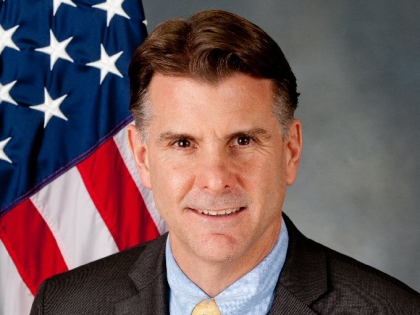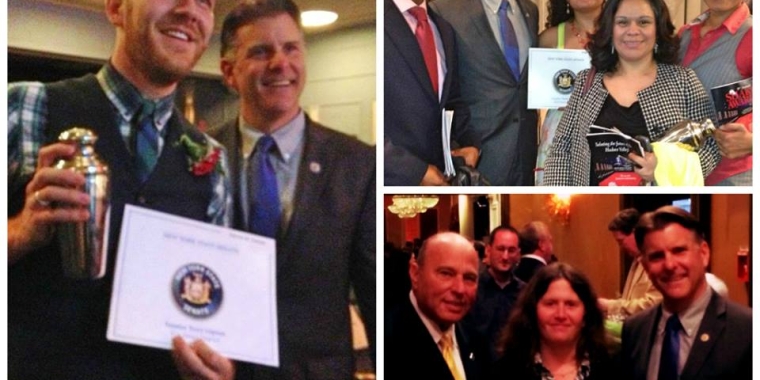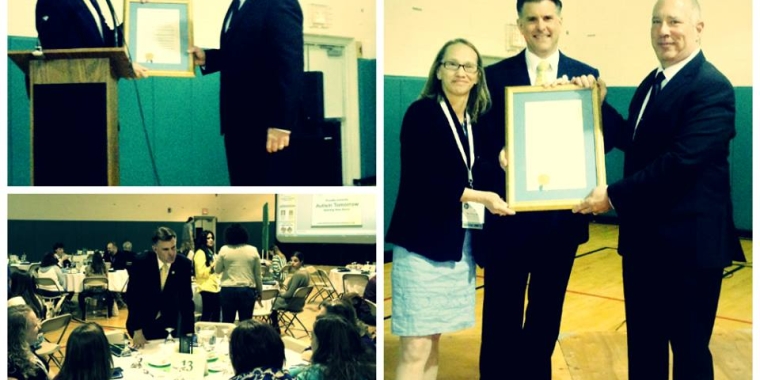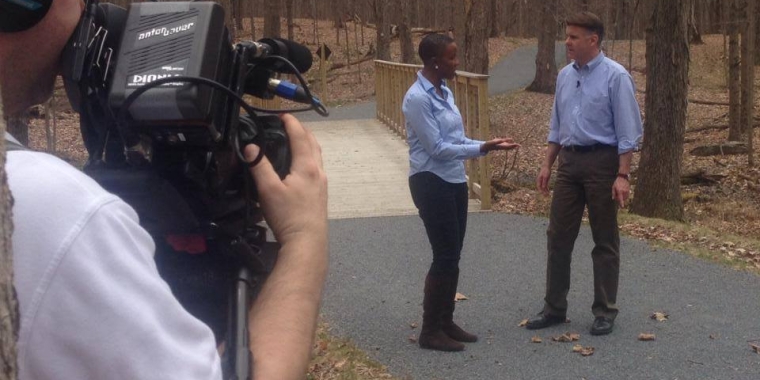
Sen. Gipson, Asm. Abinanti, Asm. Buchwald & Advocates Call on NYS to Keep Fracking Waste Out of New York
Terry Gipson
April 21, 2014

For Immediate Release: April 21, 2014
Media Contact: Jonathan Heppner | 845.463.0840 | heppner@nysenate.gov
SEN. GIPSON, ASM. ABINANTI, ASM. BUCHWALD & ADVOCATES CALL ON NYS TO KEEP FRACKING WASTE OUT OF NEW YORK
ALBANY, NY – In recognition of Earth Day, New York State Senator Terry Gipson (D-Dutchess, Putnam) and Assemblymembers Tom Abinanti (D-Greenburgh/Mt. Pleasant) and David Buchwald (D-Westchester) reaffirmed their efforts to keep fracking waste out of New York State. Gipson and Abinanti have introduced legislation (S.3333/A.9074) that prohibits fracking wastewater from being used on highways for purposes such as melting ice. Gipson and Buchwald have introduced legislation (S.5412/A.7497) that prohibits the acceptance of fracking wastewater at water treatment facilities and landfills.
“I’m proud to work with Assemblymembers Abinanti and Buchwald on these common sense pieces of legislation to protect our environment and all New Yorkers from the variety of chemical and radioactive contaminants created by hydraulic fracturing,” said Senator Gipson. “The risk of contamination could have a serious impact on our environment, economy and public health. No one wants to invest or live in a community whose environment could be contaminated by the spread or disposal of fracking wastewater.”
“Earth Day reminds us of how dependent we are on clean air and water for our very survival. We can’t use toxic chemicals from hydrofracking that risk destroying significant parts of our water supply,” said Assemblyman Abinanti.
“Preserving clean water is one of the most important legacies we can pass on to future generations,” said Assemblyman Buchwald. “It is my pleasure to work with Senator Gipson on ensuring that hydrofracking waste doesn’t contaminate our water supply.”
The production of oil and natural gas, especially the process of hydrofracking, generates wastewater with a variety of contaminants including endocrine disruptors and radioactive materials. Despite the well-known concerns and debate over the actual process of hydofracking that has led to legislative proposals, moratoriums and administrative and/or legislative oversight and regulation, far less has been done to address the serious issue of the possible reuse or disposal of fracking wastewater which can be easily imported into New York from other states. Under current federal and state law, fracking wastewater is classified as industrial, which eliminates tracking requirements for its handling, storage, treatment, and disposal.
Kate Hudson, Watershed Program Director, Riverkeeper stated, "Passage of these bills is crucial to protect all New Yorkers from the mishandling of fracking waste going on in New York State right now. Recognizing the environmental and health hazards from this waste stream, a dozen New York counties have already taken action to ban improper reuse and disposal of these waste products to protect their citizens. It's time for the State Legislature to follow suit and get fracking waste off our roads and out of our landfills and treatment plants."
Katherine Nadeau, Policy Director, Environmental Advocates of New York said, "New Yorkers oppose fracking because of the many public health and environmental dangers that are coming to light in states that bought the industry's propaganda and rushed to drill. The companies operating in those states should not be sneaking their waste into our backyards. It is unsafe and unscrupulous. Environmental Advocates applauds Senator Gipson and Assemblymen Abinanti and Buchwald for standing up for our health and environment, and we urge leadership in both houses of the legislature to listen to the public and stop the looming threat of fracking in New York."
Wastes from fracking often contain toxics like heavy metals, volatile organic compounds, and radioactive materials, so spreading them on New York roads—where they can wash into soil or underground sources of drinking water—or dumping them at small-town landfills or water treatment plants not equipped to handle them, simply makes no sense,” said Dan Raichel, Project Attorney, Natural Resources Defense Council. “By ensuring that these industrial wastes have three less ways to end up in a water glass, Senator Gipson's, and Assemblymembers Abinati and Buchwald's bills would make all New Yorkers safer.”
"New York has rightly delayed shale gas production within its borders because of concern about the health and environmental impacts. Yet bringing in toxic fracking waste from other states poses the same kinds of risks," said Nadia Steinzor, Eastern Program Coordinator, Earthworks. "These bills would stop dangerous practices statewide and are a big step forward in protecting New York's water, air, and communities."
"Fracking waste can contain a number of pollutants, such as chemicals, metals, and organic compounds that may be harmful to public health and the excess salts used can damage infrastructure and harm the environment,” said Ellen Webb, Energy Program Associate, Center for Environmental Health. A number of New York counties have passed measures to ban road spreading of fracking waste. We applaud Senator Gipson's, and Assemblymembers Abinati and Buchwald's efforts to keep fracking waste out of New York."
------ ------
Share this Article or Press Release
Newsroom
Go to NewsroomCongratulations Honorees!
June 5, 2014

Autism Tomorrow Conference
June 5, 2014


